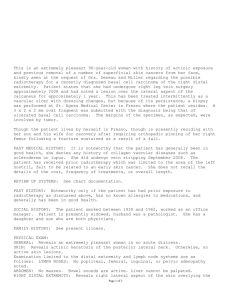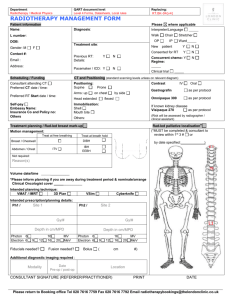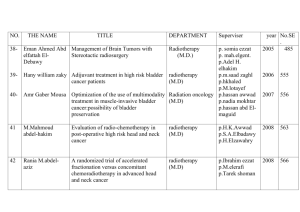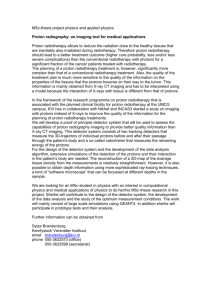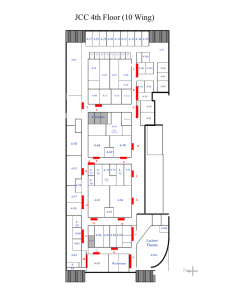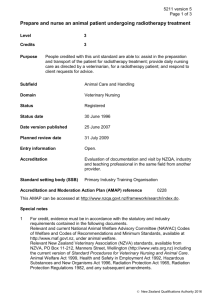Job descriptions
advertisement
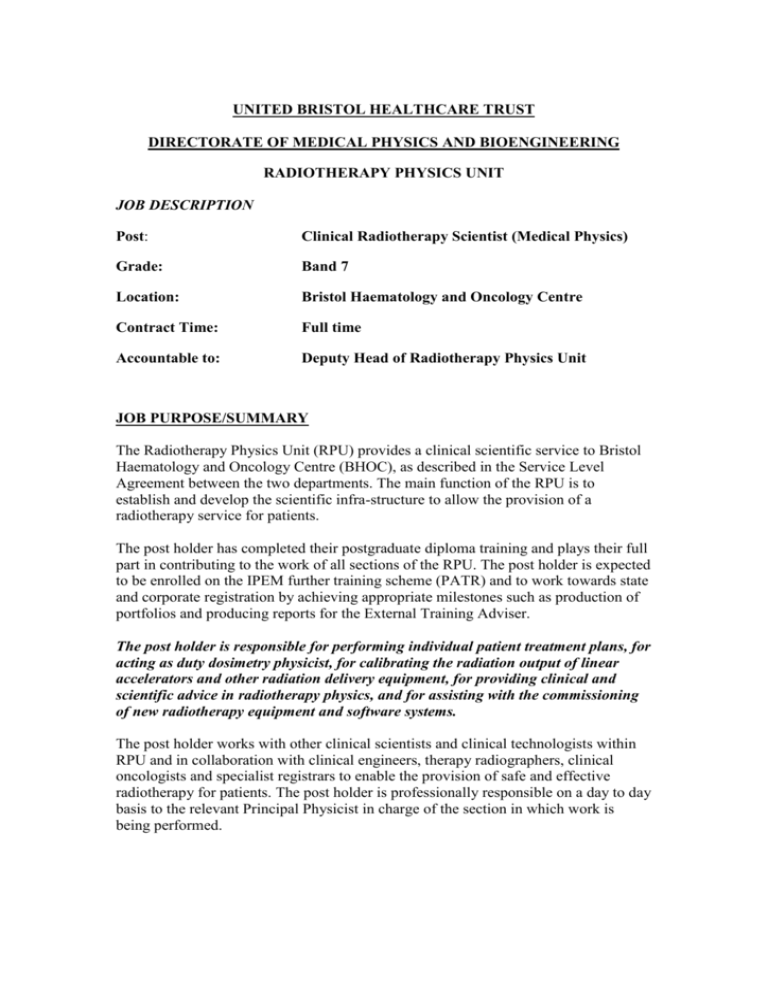
UNITED BRISTOL HEALTHCARE TRUST DIRECTORATE OF MEDICAL PHYSICS AND BIOENGINEERING RADIOTHERAPY PHYSICS UNIT JOB DESCRIPTION Post: Clinical Radiotherapy Scientist (Medical Physics) Grade: Band 7 Location: Bristol Haematology and Oncology Centre Contract Time: Full time Accountable to: Deputy Head of Radiotherapy Physics Unit JOB PURPOSE/SUMMARY The Radiotherapy Physics Unit (RPU) provides a clinical scientific service to Bristol Haematology and Oncology Centre (BHOC), as described in the Service Level Agreement between the two departments. The main function of the RPU is to establish and develop the scientific infra-structure to allow the provision of a radiotherapy service for patients. The post holder has completed their postgraduate diploma training and plays their full part in contributing to the work of all sections of the RPU. The post holder is expected to be enrolled on the IPEM further training scheme (PATR) and to work towards state and corporate registration by achieving appropriate milestones such as production of portfolios and producing reports for the External Training Adviser. The post holder is responsible for performing individual patient treatment plans, for acting as duty dosimetry physicist, for calibrating the radiation output of linear accelerators and other radiation delivery equipment, for providing clinical and scientific advice in radiotherapy physics, and for assisting with the commissioning of new radiotherapy equipment and software systems. The post holder works with other clinical scientists and clinical technologists within RPU and in collaboration with clinical engineers, therapy radiographers, clinical oncologists and specialist registrars to enable the provision of safe and effective radiotherapy for patients. The post holder is professionally responsible on a day to day basis to the relevant Principal Physicist in charge of the section in which work is being performed. MAIN DUTIES AND RESPONSIBILITIES Clinical/Scientific: Assist with the treatment planning and dosimetry work of the Unit, including developing and introducing new techniques and protocols, implementing changes in techniques, performing quality control checks and routine and definitive calibrations on linear accelerators, and commissioning new dosimetry equipment. Contribute to the commissioning of new radiotherapy equipment, including linear accelerators, orthovoltage units, simulators and brachytherapy afterloading equipment. Contribute to the commissioning of radiotherapy treatment planning systems. Provide, with others, specialist clinical technical services such Total Body Irradiation (TBI) and Precision Intra-Cranial Radiotherapy (PIRT). Assist with developments in radiotherapy physics computing, i.e, writing software for radiotherapy clinical and physics applications. Contribute to the provision and development of the brachytherapy services of the Unit, including dosimetry of brachytherapy sources and developments associated with new equipment. Provide complex scientific and technical advice in respect to radiotherapy treatments to clinical oncologists and other clinical staff. Involvement, as necessary, in the routine work of the Unit, including acting as duty physicist for dosimetry. Managerial: Implement policies to improve the provision of radiotherapy physics services in terms of scope and efficiency and contribute to the formulation of new policies/procedures. This could include writing Work Instructions or other documentation for new procedures, and involvement in the training of clinical technologists or other members of RPU in the new method of working. Be responsible for the safe use of highly complex, expensive and potentially hazardous radiotherapy equipment, such as linear accelerators, brachytherapy afterloading equipment, and dose meters. Teaching, training and research: Supervise trainee clinical scientists on placement in RPU as appropriate. Participate in the lecturing and teaching commitments of the Radiotherapy Physics Unit to physicists, technical, radiographic and medical staff. Provide training for other staff in RPU in work procedures and use of equipment for which the post holder is responsible. Regularly undertake development work such as the commissioning of new, state-of-the-art radiotherapy equipment. Participate in research and development projects and in clinical audit. Present original scientific work by lecturing at meetings and conferences, and through publication in scientific and medical journals. Present seminars and feedback on meetings/conferences. Professional: Undertake the IPEM further training scheme (PATR) Keep abreast of current scientific and technical developments and their applications in the field of radiotherapy physics and associated fields through participation in the IPEM Continuing Professional Development Scheme. Ensure all activities for which she/he is responsible are carried out within the quality framework adopted by the RPU, and conform with Statutory Regulations, Approved Codes of Practice and Local Safety Rules. Miscellaneous: Undertake other duties as may be required by the Head of the Radiotherapy Physics Unit. The post-holder must be flexible with regard to hours of working and will be expected to work occasionally in unsocial hours and weekends as do others in the department. General information: Job descriptions All job descriptions are subject to review. Job holders are expected to be flexible and be prepared to carry out any similar or related duties which do not fall within the work outlined. Any review will be undertaken by the line manager, in consultation with the post holder. Health and safety Under the provisions contained in the Health and Safety at Work Act 1974, it is the duty of every employee to: take reasonable care of themselves and for others at work to co-operate with the Trust as far as is necessary to enable them to carry out their legal duty not to intentionally or recklessly interfere with anything provided including personal protective equipment for Health and Safety or welfare at work. Senior Management (including Clinical Directors and General Managers) Senior Management is responsible for the implementation throughout the Trust of suitable arrangements to ensure the health, safety and welfare of all employees at work and the health and safety of other persons who may be affected by their activities. Where health and safety matters cannot be resolved at Senior Management level the appropriate Executive Director must be notified. Line Managers Each manager is responsible for the health and safety management of all activities, areas and staff under their control. This includes responsibility for ensuring risk assessments are completed and implementation of suitable and sufficient control measures put in place. Health and safety issues are dealt with at the lowest level of management practicable. Where health and safety matters cannot be resolved at a particular management level the appropriate Senior Manager must be notified. Clinical governance Clinical Governance is the framework through which this Trust is accountable for continuously improving the quality of its services and safeguarding the high standards of care. It does so by creating and maintaining an environment in which excellence in clinical care will flourish. Every member of staff must work within this framework as specified in his/her individual job description. If you have concerns on any clinical governance matters these should be raised with your line manager, professional adviser, or a more senior member of management. Your attention is also drawn to the Trust guidance on Raising Concerns about Provision of Patient Care. The Working Time Regulations 1998 You are required to comply with Trust policy on implementation of the Working Time Regulations, including declaration of hours worked and breaks taken, completing written records if required, and reporting any instances where your pattern of working hours may constitute a health and safety risk to yourself, patients, the public an other Trust employees. You have the right not to be subjected to any unlawful detriment by reporting any concerns under the Regulations. Additional Work You are required to disclose any additional work you undertake or are planning to undertake for another employer. The Trust will permit you to undertake this additional work providing the Trust is satisfied that this does not conflict with the interests of the organisation, performance of your normal duties or with the requirements of the Working Time Regulations. Trust jd/standard wording/2002 UNITED BRISTOL HEALTHCARE NHS TRUST Clinical Radiotherapy Scientist (Medical Physics), Band 7 PERSON SPECIFICATION Qualifications: QT1 The post holder must have a BSc or equivalent in physics or engineering QT2 The post holder must have a postgraduate qualification in a relevant branch of physics or medical physics to the level of MSc or higher. QT3 The postholder should have Dip IPEM or equivalent in Medical Physics or Medical Engineering Previous Experience: E1 The post holder must have spent a minimum of three months working in a radiotherapy physics department as part of their initial training, and have experience of a range of working practices and procedures in radiotherapy physics. Skills/Knowledge/Aptitude: Knowledge SA1 The post holder must have a highly developed specialist knowledge of the range of work procedures of radiotherapy physics at least to Masters level, and practical experience gained through training clinical placements. This will include practical and theoretical knowledge of patient and machine dosimetry in radiotherapy, and treatment planning techniques. SA2 The post holder must have an understanding of and ability to create and use mathematical, computer and dosimetry algorithms in radiotherapy physics. Communication skills SA3 The post holder must be able to communicate highly complex information, e.g., postgraduate level physics material to other professional groups, both in a teaching/training situation, and as a contributor in multi-disciplinary decisionmaking processes, such as the treatment of an individual patient, or the development and introduction of a new treatment protocol. Must be skilled at receiving and understanding information from the oncologist about the extent of a patient’s disease, the radiation dose constraints for organs at risk, radiobiological factors, etc. SA4 The post holder must be able to present scientific papers on complex subjects to large audiences at national/international conferences. Complex subjects include detailed analyses of proposed and new scientific developments involving mathematical and radiation dosimetry algorithms, computer treatment planning algorithms and so on. SA5 The post holder must be able to deal with complex and unpredictable situations. SA6 The post holder must have good negotiating skills. Managerial skills SA7 The post holder needs to able use their judgement and analytical skills in weighing factors that may be conflicting when comparing and choosing from a range of options, for example, in analysing the results of scientific measurements or processes, which may conflict, and deciding upon an appropriate course of action. SA8 The post holder must be able to prioritise and manage his/her own work. The post holder is also required to organise certain work activities, for example acting as physics ‘team leader’ for precision intra-cranial radiotherapy, which involves co-ordinating all stages of the PIRT cycle in close contact with all members of the multidisciplinary team (i.e. oncologist, dentist, physicists, radiographers, clinical technologists and occasionally company representatives). SA9 The post holder follows protocols for routine procedures but must have the understanding to take appropriate action when results, eg, of equipment calibrations, are unexpected. This includes knowing when to refer to a more experienced member of staff. for advice. In development work, the post holder is guided by professional best practice and published work, and by discussion with the project leader, but is expected to act independently and exercise own initiative. IT skills SA10 The post holder must be competent in the use of wordprocessing, spreadsheet and database software in order, for example, to present results of measurements. SA11 The post holder must have system development skills relevant to radiotherapy computing systems. Physical skills SA 12 The post holder must have highly developed manual dexterity in order to be able to set up delicate equipment to fine tolerances (within 0.5mm) for making precision measurements of radiation dose, and of accuracy of dose-delivery equipment, and must have excellent hand-eye co-ordination in order to make precise distance measurements on radiotherapy treatment planning computers and to position points and delineate contours accurately. The post holder is also required to fit stereotactic headframes to vulnerable patients, which requires highly developed physical skills where precision and speed are important. SA13 The post holder will occasionally be expected to manoeuvre, within the limits required for manual handling, medium/heavy loads such as radiotherapy dosimetry “phantoms” (8-12kg), or lead shielding of similar weight. Aptitudes A1 The post holder must be able to concentrate where the work pattern is unpredictable, for instance as duty physicist they may be called away from a task in order to deal with an unexpected treatment machine breakdown. Occasionally, there will be a requirement for prolonged concentration, for instance, in producing a brachytherapy treatment plan the post holder must maintain a high level of concentration throughout several processes including patient imaging, data entry to treatment planning system, optimisation of calculated dose distribution, discussion with oncologist, transfer of treatment plan to treatment unit, and performing pre-treatment checks. A2 The post holder works in an environment of cancer patients, and has to interact with them (for example, in making in-vivo dose measurements, or in advising on a patient’s treatment in their presence). He/she must therefore have the resilience to cope with occasional exposure to distressing circumstances. A3 The post holder must be prepared to work in an environment where there is a radiation hazard, for example, calibrating dose measuring equipment with radioactive sources. (D) indicates desirable. All other parts of the person specification are essential requirements. Reviewer: 23/3/04 HJA Date: 23rd March 2004

